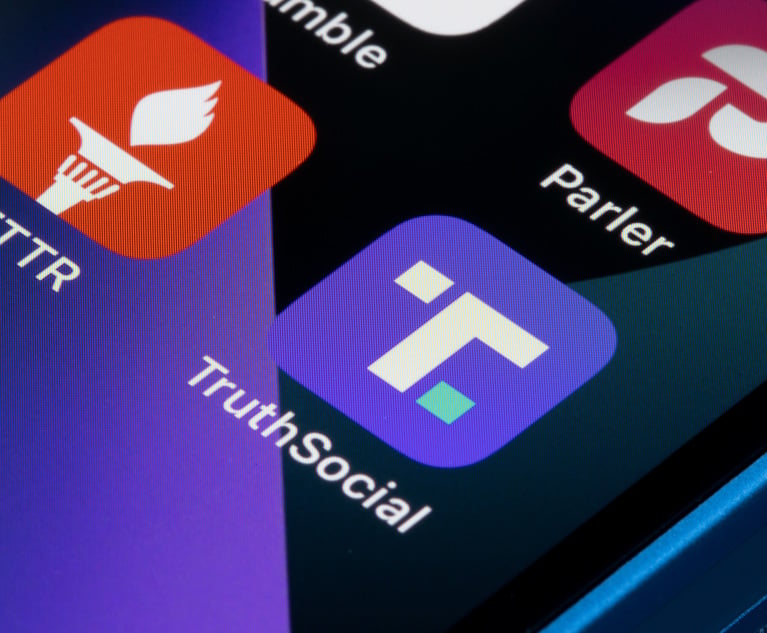 Matthew Evan Corcoran. Photo: Ting Shen/Bloomberg
Matthew Evan Corcoran. Photo: Ting Shen/Bloomberg Trump Lawyers Rotate Among Inner Circle as Legal Woes Mount
Former President Donald Trump's latest lawyers in connection with the congressional and criminal investigations into the Jan. 6 insurrection are Matthew Evan Corcoran, pictured, and John Rowley III, Washington-area attorneys already involved in legal fights related to the Capitol attack and its aftermath.
August 10, 2022 at 01:41 PM
6 minute read
NewsAs the legal risks facing Donald Trump and his inner circle continue to expand, the former president and key allies have been playing round robin with a small pool of defense lawyers.
Trump will sit for a seven-hour deposition by the New York attorney general Wednesday, two days after the FBI searched his Mar-a-Lago estate as part of an investigation into whether classified material was mishandled. To fight any potential federal challenges, the former president is pulling from a cadre of lawyers in his orbit with proven conservative bona fides or a track record of representing people loyal to him.
"It used to be in Washington that white-collar lawyers would represent both Democrats and Republicans who were caught up in an investigation. What mattered was whether the lawyer was good and not the lawyer's ideology," defense attorney Matt Kaiser, who also teaches attorney ethics at Georgetown University Law Center, said in an email. These days, "It's a D.C. lawyer version of the political polarization that is happening across the country."
Trump's latest lawyers in connection with the congressional and criminal investigations into the Jan. 6 insurrection are Matthew Evan Corcoran and John Rowley III, Washington-area attorneys already involved in legal fights related to the Capitol attack and its aftermath.
Corcoran and Rowley are representing Trump in negotiations with federal prosecutors over potential executive privilege issues related to Trump's conversations with advisers during Jan. 6, according to a person familiar with the situation. The Washington Post reported that Corcoran and lawyer Christina Bobb met with a senior Justice Department official and several investigators earlier in the summer at Mar-a-Lago to discuss and review boxes related to the probe into whether Trump had records that should have gone to the National Archives.
Corcoran is fresh off longtime Trump adviser Steve Bannon's contempt of Congress conviction by a federal jury in Washington. Rowley is representing former Trump trade adviser Peter Navarro in his pending contempt case, and has counseled Trump allies Stephen Miller and Cleta Mitchell in trying to fend off their own Jan. 6 committee subpoenas. Both lawyers have donated to Republican candidates in the past, Federal Election Commission records show, including, in Rowley's case, Trump.
Corcoran and Rowley did not return requests for comment on Tuesday. A Trump spokesman and Bobb, a former host for the conservative-leaning One America News Network and a lawyer for Trump's Save America PAC, also didn't respond to messages seeking comment.
Meanwhile, Rolling Stone reported that Trump had "preliminary conversations" with attorney Timothy Parlatore about strategy in the event he's hit with criminal charges. Parlatore did not return a request for comment. His previous clients include former New York City police commissioner and Trump campaign adviser Bernie Kerik, and Eddie Gallagher, a Navy SEAL whose court-martial case became a conservative rallying point.
There are a number of overlapping circles when it comes to who has represented Trump and the people around him. Besides Corcoran, Bannon's legal team featured David Schoen, who represented Trump in his post-Jan. 6 impeachment trial before the US Senate, and Robert Costello, whose past clients include Rudy Giuliani. A jury found Bannon guilty last month, but that doesn't mean Corcoran is done with the case; last week Bannon's legal team filed a motion arguing for a new trial.
The last time Trump went to court over the fate of his White House records, he was represented by Jesse Binnall. Binnall, who unsuccessfully argued to block the Jan. 6 committee's access to some of Trump's archived materials, had previously been part of the defense team representing Michael Flynn against allegations that he lied to the FBI during the investigation into Russian interference in the 2016 election. Flynn's case paired Binnall with Sidney Powell, the conservative attorney who became a driving force behind the false conspiracy theories that there was widespread fraud in the 2020 election.
Binnall declined to comment; there's no public indication to date that he's representing Trump in connection with the Mar-a-Lago search. Binnall is representing Trump in civil lawsuits seeking to hold him liable for the violence at the Capitol and the disruption of Congress' certification of the election.
It's not easy being Trump's lawyer. Michael Cohen went to prison for tax fraud, bank fraud, violations of campaign finance laws and lying to Congress for his boss. Giuliani had his law license stripped in New York and the nation's capital for his role in lawsuits seeking to overturn the result of the 2020 presidential election; Powell and John Eastman face similar challenges. And the House Jan. 6 committee heard some insiders in Trump's White House called his election lawyers "Team Crazy."
He's known to replace some of his higher profile lawyers with those who are lesser known and have smaller practices, such as Alina Habba, who came into Trump's orbit as a member of his golf club in Bedminster, New Jersey. She's taken over his challenges to the New York attorney general's probe of his business and his defense against a fraud suit brought by his niece and a long-running defamation case brought by writer E. Jean Carroll.
Lawyers can represent multiple clients in related cases or even those facing shared criminal charges, but they have to follow ethics rules enforced by state bars. They have an obligation to make sure clients understand any conflicts of interest.
A client can waive those conflicts, but prosecutors can later raise a flag and judges can step in if they think that diverging interests are too deep to ensure that each person gets appropriate legal representation, if one person wants to plead guilty and cooperate with the government against the other, for instance, said Kathleen Clark, a legal ethics expert who practices in Washington and is a professor at Washington University in St. Louis School of Law.
If Navarro had a change of heart and decided to cut a deal with prosecutors and cooperate against Trump, that could pose a conflict problem for Rowley, Clark said. She said there could be other conflicts if lawyers handling Jan. 6-related matters had some other connection to Trump, if they were being paid by someone on his behalf or from funds he controlled, for instance.
"It's in Trump's interest certainly for them all to stick together and resist, whether it's Congress or the Justice Department investigation or any civil litigation that would be aimed at helping uncover info about Jan 6," Clark said.
Zoe Tillman reports for Bloomberg News.
NOT FOR REPRINT
© 2024 ALM Global, LLC, All Rights Reserved. Request academic re-use from www.copyright.com. All other uses, submit a request to [email protected]. For more information visit Asset & Logo Licensing.
You Might Like
View All


Trump Media Accuses Purchaser Rep of Extortion, Harassment After Merger
4 minute readTrending Stories
- 1'Largest Retail Data Breach in History'? Hot Topic and Affiliated Brands Sued for Alleged Failure to Prevent Data Breach Linked to Snowflake Software
- 2Former President of New York State Bar, and the New York Bar Foundation, Dies As He Entered 70th Year as Attorney
- 3Legal Advocates in Uproar Upon Release of Footage Showing CO's Beat Black Inmate Before His Death
- 4Longtime Baker & Hostetler Partner, Former White House Counsel David Rivkin Dies at 68
- 5Court System Seeks Public Comment on E-Filing for Annual Report
Who Got The Work
Michael G. Bongiorno, Andrew Scott Dulberg and Elizabeth E. Driscoll from Wilmer Cutler Pickering Hale and Dorr have stepped in to represent Symbotic Inc., an A.I.-enabled technology platform that focuses on increasing supply chain efficiency, and other defendants in a pending shareholder derivative lawsuit. The case, filed Oct. 2 in Massachusetts District Court by the Brown Law Firm on behalf of Stephen Austen, accuses certain officers and directors of misleading investors in regard to Symbotic's potential for margin growth by failing to disclose that the company was not equipped to timely deploy its systems or manage expenses through project delays. The case, assigned to U.S. District Judge Nathaniel M. Gorton, is 1:24-cv-12522, Austen v. Cohen et al.
Who Got The Work
Edmund Polubinski and Marie Killmond of Davis Polk & Wardwell have entered appearances for data platform software development company MongoDB and other defendants in a pending shareholder derivative lawsuit. The action, filed Oct. 7 in New York Southern District Court by the Brown Law Firm, accuses the company's directors and/or officers of falsely expressing confidence in the company’s restructuring of its sales incentive plan and downplaying the severity of decreases in its upfront commitments. The case is 1:24-cv-07594, Roy v. Ittycheria et al.
Who Got The Work
Amy O. Bruchs and Kurt F. Ellison of Michael Best & Friedrich have entered appearances for Epic Systems Corp. in a pending employment discrimination lawsuit. The suit was filed Sept. 7 in Wisconsin Western District Court by Levine Eisberner LLC and Siri & Glimstad on behalf of a project manager who claims that he was wrongfully terminated after applying for a religious exemption to the defendant's COVID-19 vaccine mandate. The case, assigned to U.S. Magistrate Judge Anita Marie Boor, is 3:24-cv-00630, Secker, Nathan v. Epic Systems Corporation.
Who Got The Work
David X. Sullivan, Thomas J. Finn and Gregory A. Hall from McCarter & English have entered appearances for Sunrun Installation Services in a pending civil rights lawsuit. The complaint was filed Sept. 4 in Connecticut District Court by attorney Robert M. Berke on behalf of former employee George Edward Steins, who was arrested and charged with employing an unregistered home improvement salesperson. The complaint alleges that had Sunrun informed the Connecticut Department of Consumer Protection that the plaintiff's employment had ended in 2017 and that he no longer held Sunrun's home improvement contractor license, he would not have been hit with charges, which were dismissed in May 2024. The case, assigned to U.S. District Judge Jeffrey A. Meyer, is 3:24-cv-01423, Steins v. Sunrun, Inc. et al.
Who Got The Work
Greenberg Traurig shareholder Joshua L. Raskin has entered an appearance for boohoo.com UK Ltd. in a pending patent infringement lawsuit. The suit, filed Sept. 3 in Texas Eastern District Court by Rozier Hardt McDonough on behalf of Alto Dynamics, asserts five patents related to an online shopping platform. The case, assigned to U.S. District Judge Rodney Gilstrap, is 2:24-cv-00719, Alto Dynamics, LLC v. boohoo.com UK Limited.
Featured Firms
Law Offices of Gary Martin Hays & Associates, P.C.
(470) 294-1674
Law Offices of Mark E. Salomone
(857) 444-6468
Smith & Hassler
(713) 739-1250







